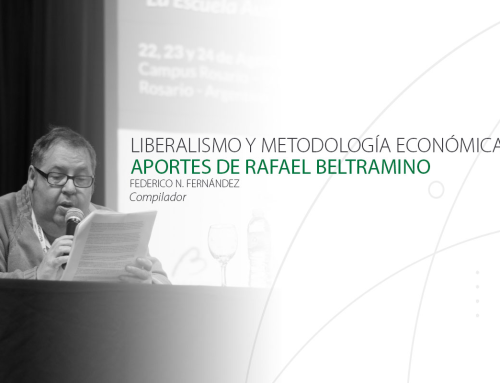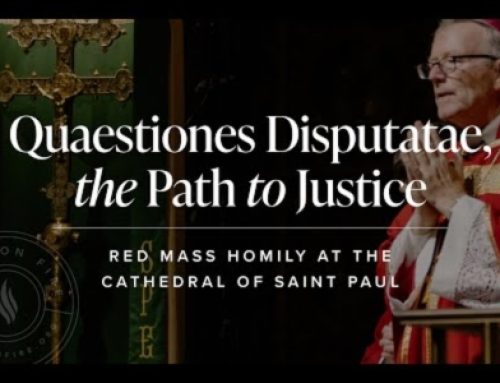Por Samuel Gregg
Fuente: AIER
11 de febrero de 2022
Eighty years ago, a book was published in Zurich, Switzerland that purported to explain what its author called “the sickness of our civilization” and “the manner of its cure.” The author, Wilhelm Röpke, was most known for being one of Europe’s leading economists and a prominent defender of markets at a time when many were convinced that market liberalism was discredited. But among the thousands who purchased Die Gesellschaftskrisis der Gegenwart (later published in English as The Social Crisis of Our Time) that year, more than a few were surprised that Röpke had penned a text that went far beyond economics in its scope.
Röpke had finished writing the book in November 1941. That very same month, the German Wehrmacht was surging towards Moscow in a desperate effort to break the Soviet Union’s will to fight. Japan would soon strike Pearl Harbor and embark upon its lightning conquest of South-East Asia. November 1941 was also the month when, we now know, the Nazi regime made the decision to embark upon the Final Solution which would start the trains rolling from across Europe, conveying the Jewish people to their annihilation in death camps in the East.
In short, the prospects for reviving free societies seemed dim. That, however, may explain why The Social Crisis’s impact inside Switzerland and Nazi-occupied Europe was so immediate. More than a few people were wondering how, after a 19th century marked by such economic and scientific progress, the West was teetering for the second time in twenty years on the brink of self-destruction. They were also anxious to find solutions, and many saw the economic blueprint offered by John Maynard Keynes as part of the way forward. The Social Crisis offered both a comprehensive analysis of the causes of Europe’s trauma, but also a very different path for the future.
The Social Crisis’s first edition of 10,000 copies quickly sold out and several reprints followed. This was at a time when paper was subject to strict wartime rationing. The book was reviewed by every major newspaper in Switzerland, including those of a socialist disposition who found themselves unable to ignore it. Copies were smuggled into Fascist Italy, Vichy France, Hungary, and eventually the Third Reich itself. In Germany, Ludwig Erhard, the future postwar economics minister, read his clandestine copy of The Social Crisis carefully. It became a major reference point for Erhard’s liberalization of the West German economy in 1948 and the subsequent economic miracle. Translations of the book were steadily made into every major European language. Ten years after it first appeared, The Social Crisis was still being reviewed in major publications like Foreign Affairs.
Writing the book was a risky endeavor for Röpke. No one who read it could doubt Röpke’s low opinion of National Socialism. In 1933, Röpke had gone into exile after being purged from the University of Marburg on account of his outspoken anti-Nazi views. Nine years later, Röpke may have been serving as a distinguished professor of economics in neutral Switzerland, but he was still a German citizen. His son Berthold had just become eligible for conscription into the German army. These were just some of the pressure-points that Berlin could use against him.
At one point, senior SS security officers pushed for stripping Röpke of his German citizenship on account of The Social Crisis’s “anti-German attitude” and “extreme humanist and cosmopolitan orientation.” This would have created enormous difficulties for Röpke and his family with the Swiss authorities, never keen on stateless persons. In the end, German diplomats persuaded the powers-that-be in Berlin that it would not help the Reich’s image in Switzerland and Europe more widely to be seen harassing one of Germany’s most internationally-known scholars—not to mention one who was a highly-decorated First World War combat veteran, and who personified in his looks and athleticism the Aryan Übermensch that Nazism upheld as the ideal racial type.
How the West Came Undone
As it happens, the Nazi condemnation of The Social Crisis as “humanist” and “cosmopolitan” was entirely accurate. From the first page, it is obvious that Röpke is that rarity: a genuine Renaissance man familiar with many social sciences, classical and modern languages, ancient and modern history, literature, philosophy, art, music, and theology. Indeed, you quickly forget that Röpke’s field of academic endeavor was economics. Citations in the original Greek and Latin from the ancient tragedian Aeschylus and the Roman historian Tacitus leap off the pages alongside quotations from Augustine and Montesquieu and even invocations of the painting-style of Cézanne. In this and other ways, The Social Crisis reveals Röpke’s mind as that of a man of the West: someone rooted firmly in the worlds of Jerusalem, Athens, and Rome but also forged by the better lights of Enlightenment thought.
Röpke’s previous books had been focused on topics like monetary policy, business-cycle theory, and trade policy. But like other market-orientated German economists who came to prominence in the 1930s—people like Walter Eucken, Alexander Rüstow, and Franz Böhm—Röpke had become convinced that the deeper roots of twentieth-century Europe’s crack-up went beyond economics and were to be found in the realms of philosophy, politics, and culture. Nineteenth-century liberalism was not exempt from that critique, insofar as Röpke and other ordo-liberals argued that too many liberals of that century had failed to see that “a market economy needs a firm moral, political, and institutional framework” capable of resisting “the unbridled rule of vested interests” who had proved adept at coopting state power to get their way. That claim become a point of contention between Röpke and the Austrian economist Ludwig von Mises as early as 1938.
It was not that market economics or free economies in themselves were the problem. The second, third, and fourth chapters of The Social Crisis outline a powerful defense of markets against the collectivist alternatives, ranging from Communism to Keynesian full employment policies. Röpke’s concern was with the moral, political, and cultural contexts within which markets operated. This, he argued, was where things had gone badly wrong.
One source of the rot within the West was what Röpke called “rationalism.” By this, Röpke didn’t mean natural law. He regarded this as a necessary philosophical foundation for any civilized society. Nor did Röpke identify the empirical method as itself problematic. Röpke’s target was the application of a priori scientific reasoning, which he associated with figures like Hegel and movements like the French Revolution, to every field of human life in the name of constructing a more rational social order. The rationalist mindset, Röpke stated, was inclined to regard anything which fell outside the realm of the empirical and measurable as obscure or an impediment to the advance of knowledge. It also encouraged the illusion that you could redesign entire societies from the top down, as if people were cogs in a machine. Therein, Röpke said, lay the road to economic and political collectivism.
That rationalism went hand-in-hand with another 19th-century phenomenon: that being the steady concentration of state power. Monarchical absolutism may have been on its way out, but Röpke believed that power had in other respects become more centralized, including in countries in which constitutional and democratic forms of government had emerged. This was partly a function of many people wanting governments to do more in the economy, and using their newly acquired voting rights to support politicians who promised to use the state to protect and subsidize industries or deliver welfare programs.
Nor, Röpke argued, had democratic regimes proved resistant to the pressures exercised by well-organized interest-groups intent on acquiring legal and economic privileges at everyone else’s expense. The German economy’s cartelization may have begun in late-Wilhelmine Germany, but Röpke stressed that the advent of the liberal Weimar Republic—“the freest constitution in the world,” as The Social Crisis describes it—had not brought an end to such practices. On the contrary, cartelization and the associated legalized limitation of competition had accelerated. This had made it easier for the National Socialists to bring more and more of the economy under direct state control once they took power in 1933.
The Ambiguity of Liberalism
Liberalism’s role in these developments was an issue that Röpke, as a noted market liberal economist, had plainly thought long and hard about. On the one hand, he stressed that liberal movements with their emphasis on equality before the law had helped remove many of the obstacles based on birth that had inhibited social and economic advancement from the bottom-up. They had also delivered forms of constitutionalism that constrained arbitrary power and ended absolutism in many European countries. He also believed that liberalism’s particular emphasis on economic freedom had produced enormous prosperity and enabled millions to escape back-breaking rural poverty and early death. In The Social Crisis, Röpke called this the “splendor” of capitalism.
Nevertheless, Röpke maintained that a fair amount of liberal thought had been influenced by rationalist tendencies. Liberalism’s emergence in the context of Enlightenment Europe had occurred alongside the turn to the empirical, and, to some extent, had become identified with it. This had, Röpke claimed, accentuated the hostility to religion that characterized some strands of 19th century continental European liberalism which dismissed faith as mere superstition. That lead to a fatal underestimation of religion’s importance in providing answers to eternal questions that neither philosophy nor science could, as well as religion’s capacity to express and preserve moral norms that encouraged people to address social problems that markets couldn’t. These were quintessentially Tocquevillian observations.
According to Röpke, the same rationalism lacked the capacity to inhibit the development of ideologies that sought to provide the same type of comprehensive explanation of life that religion seeks to articulate. For Röpke, man was by nature homo religiosus. Rationalism had merely secularized that innate instinct and thereby contributed to the problem of people trying to build heaven-on-earth, whether the proletariat paradise promised by Communism or the racially-pure nirvana for which National Socialism yearned. Either way, the consequences for liberty were dire.
No West, No Liberty
By no means did Röpke conclude that liberalism needed to be dispensed with. The Social Crisis underscored that liberalism’s achievements in the realms of economics and constitutional government were substantial. If anything, Röpke thought that these successes needed to be revitalized by a renewal of entrepreneurship and competition as well as the restoration of the rule of law. The real challenge, to Röpke’s mind, was two-fold. First: could liberalism could be purged of rationalist and scientistic tendencies? Second: could it be infused with a normative content that reflected the broad civilizational accomplishments of the West?
Röpke was fully aware of the inner tensions marking Western culture. Not everything bequeathed by Greece, Rome, Judaism, Christianity, and the various Enlightenments fits neatly together. The differences were and are real. Yet Röpke was convinced that there were enough common threads in the realm of institutions and moral norms that could sustain freedom, underscore the difference between virtue and vice, and promote the idea that man was made as imago Dei. Believers and non-believers alike, Röpke held, could recognize that this conception of human beings, first articulated in the Hebrew Scriptures, was a formidable foundation for human liberty. No one should therefore be surprised that Nazism and Communism sought to pulverize the idea and replace it with racial and class hierarchies respectively.
Therein lay the achievement of The Social Crisis of Our Time. While much of it was about the importance of markets and the follies of collectivism, Röpke’s book reminded readers that freedom’s preservation required a culture that embodied and conveyed a particular understanding of human beings. In that regard, Röpke fully embraced Lord Acton’s dictum that liberty “is the delicate fruit of a mature civilization.” That was a message that a Europe perilously close to subjugation by a diabolical regime in 1942 badly needed to hear. Yet it is no less a warning, I’d submit, to those who claim to care about freedom today. Yes, markets and constitutionalism are vital for a free society. But if you ignore, trivialize, or even try to expunge the civilizational roots of liberty, dystopia and tyranny will surely follow.





Deja tu comentario